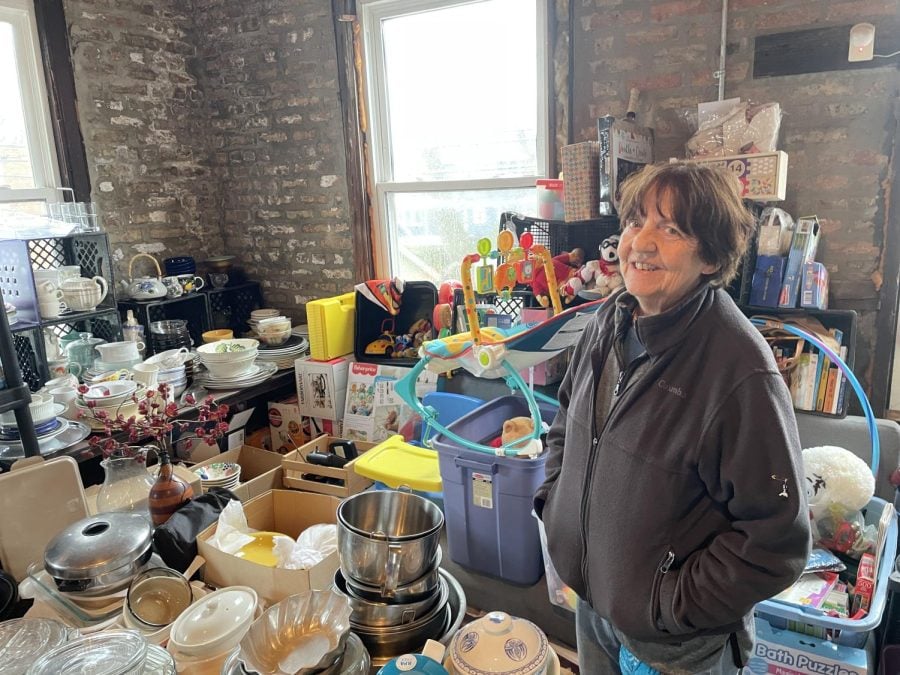‘They come with absolutely nothing:’ Evanston volunteers help incoming Afghan refugees settle in
Saul Pink/The Daily Northwestern
Barbara Ryan at her “free store” for refugees in Rogers Park. With the recent influx of Afghan refugees arriving in the Chicago and Evanston areas, Ryan’s store has been packed with donated clothes, appliances and other household items.
April 1, 2022
When Pat Ryan Nelson began organizing donations for Afghan refugees, she started to call herself the “baby clothes folder.”
Now, Nelson — a retired teacher for Evanston/Skokie School District 65 and Evanston resident — leads other volunteers, helping to ensure families of refugees in the city have proper shoes and loading the trunk of her car with furniture to bring to their new apartments.
She is one of many Evanston residents donating their time toward helping resettle the recent influx of Afghan refugees arriving in the Evanston and Chicago areas. Over two thousand Afghans have arrived in Illinois since September, according to the Illinois Department of Human Services. Hundreds more arrived after the U.S. Department of Homeland Security set a nationwide goal to clear the bases housing refugees by Feb. 15, with continued arrivals expected in the coming months.
Refugees face challenges including learning English, finding a pathway to permanent residency and adjusting to life in the U.S. with family stuck in Taliban-controlled Afghanistan. Residents like Nelson hope to support new arrivals as they settle into Illinois homes.
Coming to a new place
When refugees land in Chicago, the U.S. State Department assigns them a resettlement agency. The government-certified nonprofit organization helps the family set up temporary housing and eventually locate a permanent home.
“Not only do (refugees) need housing, food and job readiness and ESL training, but they need a lot of hand-holding because they’re coming into a new place not knowing what needs to get done,” said Irshad Khan, who sits on the board of the Council of Islamic Organizations of Greater Chicago.
The organization is temporarily functioning as a resettlement agency with IDHS. It is working to supplement national agencies like HIAS Immigration & Citizenship, a Jewish resettlement agency with a Chicago affiliate.
Rosalie Greenberger, a volunteer at Beth Emet The Free Synagogue, has helped the synagogue collectively co-sponsor a family of six Afghan refugees living in Skokie that arrived mid-January with support from HIAS.
Volunteers helped furnish the family’s apartment and congregation members visit the family’s home twice a week.
“Sometimes it’s walking to markets in the area that have Halal food with the father,” Greenberger said. “Volunteers have been making sure (the refugees) get on the Zoom for English class.”
As more resettlement agencies have moved families into apartments in Evanston in recent months, community members have gone beyond donating their own resources and began mobilizing to support these agencies. In 2017, Nelson and Chicago resident Nan Warshaw launched Refugee Community Connection, an organization that recruits volunteers through Facebook. The group organizes placements for additional refugees in order to support professional resettlement agencies and government organizations.
A year ago, RCC’s Facebook group had 400 members, she said. It now has more than four thousand.
Evanston resident Kristin Kutzner Huzar has sponsored six families since joining RCC’s “Welcome a Refugee Household” program in December, which matches an incoming family with a group of up to ten volunteers.
When one parent Huzar sponsored gave birth two weeks ago, Huzar’s RCC network worked to help her find postnatal care.
“She had no idea where she could go to have her baby and she had no idea where she could go for a checkup,” Huzar said. “We had to pool our resources and put our heads together to figure it out.”
Life in Evanston
Evanston’s limited Afghan population made the move difficult for some families, Huzar said. Because the city does not have any Afghan grocery stores, volunteers and refugees often travel to Devon Avenue in Chicago to shop for traditional Afghan foods.
In 2017, Barbara Ryan, Nelson’s sister, opened a “free store” for refugees in Rogers Park, located on the second floor of a resident’s garage just over a mile from Evanston.
Bathroom items and clothing occupy one side of the store, while appliances, toys and electronics fill the other. Ryan advertises the store on Nextdoor and works with organizations like RCC to sign refugees up for slots to visit the store.
“Some of [the refugees] realize that we have everything,” Ryan said. “They just need to look.”
As they continue to organize networks of support devoted to furnishing apartments for refugee families, getting Afghan children into public schools and helping families learn English, volunteers still emphasize the overwhelming amount of need.
“I don’t think that people realize what it’s like for these refugees,” Nelson said. “They get one suitcase each. They come with absolutely nothing when they leave.”
Email: [email protected]
Twitter: @saullpink
Related Stories:
— Local rug shop imports Afghan rugs to support weavers
— South Asian Women of Evanston fosters community for South Asian Evanston residents
— Pritzker School of Law awards Global Jurist of the Year Award to all women judges in Afghanistan


